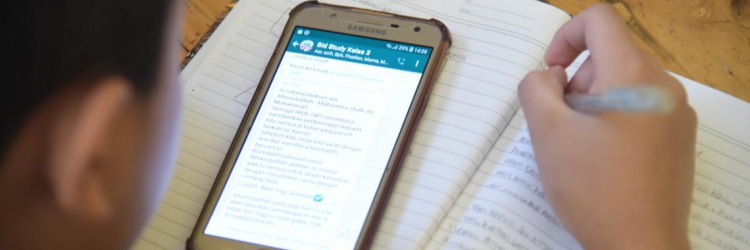.
This article is written to commemorate the National Teachers’ Day on 25 November.
.
Teacher is a noble profession. We all agree. However, some people think that teacher is an easy profession. In fact, in the journey to becoming a quality teacher, both teacher candidates and in-service teachers with years of experience have to face numerous obstacles.
The RISE study showed that beginning teachers' journey in starting their careers often begins with dilemmatic experiences, which distance them from developing their professional competencies. The Teachers’ Notes study, which recorded the experiences of a number of beginning teachers within two years after completing Teacher Professional Education (PPG), revealed that the teachers’ confidence declined after teaching for one year compared to when they had just graduated from PPG. The study also found at least five challenges faced by beginning teachers in Indonesia in the early years of their teaching careers: the teachers feel less competent, no mentors to assist them teach effectively, limited resources and unenthusiastic colleagues, difficulties in establishing communication with parents, and a myriad of additional tasks not related to teaching.
In relation to the lack of competencies of beginning teachers, although they have completed their undergraduate degree in Primary Teacher Education (PGSD) and PPG, the RISE study which evaluated the impact of the pre-service PPG showed that teachers who graduated from PPG have not demonstrated better performance than teachers who are not PPG graduates (Yusrina et al., forthcoming). Students taught by teachers who graduated from PPG did not show better learning outcomes in numeracy and literacy than students taught by teachers who did not graduate from PPG. In fact, PPG is the government’s flagship professional education programme to prepare teachers with professional teaching competencies. This indicates that the improvement of teacher education should not be in a piecemeal manner by using PPG as a shield for the government’s inability to develop its teachers colleges (LPTK) to produce quality bachelors of education.
In the Teachers’ Notes study, the team also found that the uncertainty in teachers’ recruitment in public schools and the generic teacher recruitment system in the general probationary civil servant (CPNS) scheme added to the anxiety of beginning teachers. They have increasingly disoriented towards the development of their teaching skills while the certainty of employment and decent income cannot be fulfilled. This is in line with the findings of RISE’s previous study on the complexity of teacher recruitment system in Indonesia. (Huang et al., 2020).
In an educational discussion event organised by RISE some time ago, the participants also shared their experiences as beginning teachers and the lack of support they felt in the work place.
“Beginning teachers come to school with new ideas and thoughts as well as an intention to make learning innovations. But after a few months, colleagues at school give no room to share their new ideas and thoughts in learning activities because they are too busy with administration and other matters at school or their personal matters.” – Erfan Wijayanto, primary school teacher
“Feeling alone, hinder creativity, lack of assistance, considered professional. After listening to the detailed explanation of the RISE study, it made me feel oh it’s natural that within a year the beginning teachers lost their confidence. They often get additional assignments which are not related to learning. Goodness, this is indeed the concerns we often hear from beginning teachers. That is so true, particularly for honorary teachers, it is a fact and it is real.” – Lizsa Megasari, Nusantara Learning Teacher Community (KGBN)
The many challenges faced by beginning teachers did reflect the ineffectiveness of the Indonesian education system in supporting the development of teachers’ professional identities. In fact, the early years of teaching are the golden period for beginning teachers to learn which should be filled with experiences that build a positive image of the profession itself. The current teacher professional standards, often known as the four teacher competencies, apparently have yet to be a guideline for relevant parties oriented towards the quality of effective teachers.
Based on the findings of the RISE studies, there are at least three basic forms of support which can assist the beginning teachers, particularly at the primary level, become effective teachers. These three supports are vital because they will determine the process of developing their professional identity as teachers.
1. Teacher preparation programmes should focus on improving numeracy and literacy pedagogical competencies so that they have a greater impact on student learning outcomes
The findings of the RISE study, which showed that teacher training does not have an impact on student numeracy and literacy learning outcomes, should be a reflection for LPTKs that organise teacher training to review its curriculum and relations to the competencies of the graduates produced. If teachers who graduated from the PGSD undergraduate programme, particularly those who have been certified through PPG, are unable to show good performance, who else should the education of Indonesian children be entrusted to?
The indicators used to certify the mastery of teacher competencies once they have passed the series of assessments specified in teacher training also need to be reviewed. Necessarily, teachers who are competent, or have been deemed competent, should produce competent students as well. As is often echoed by many parties, the mastery of numeracy and literacy skills of Indonesian children must be improved in order to realise competitive human resources in the future. This will be unrealistic if the teachers have not acquired good knowledge and skills to facilitate the learning process of their students.
2. Adequate induction activities
At the moment, induction for new teachers is insufficient since it only focuses on administrative and disciplinary aspects rather than teaching. In fact, induction is very important for beginning teachers to understand different work environments in schools. The absence of formal induction in the early years of work makes beginning teachers fighting for themselves in overcoming the challenges they face. Therefore, the induction mechanism for new teachers needs to be improved in order to better help beginning teachers understand their “battle fields” during the orientation year. In this regard, the role of the teacher learning community can also be maximised to share experiences in going through the early years of teaching.
In addition, the levels of teacher competencies should be divided into beginner, intermediate, and advance so that teacher professionalism development policies can be more coherent and in accordance with the needs of teachers at each level of competency. Currently, teachers in different career paths are required to have the same competencies. Beginning teachers are still in the learning stage to teach and educate. They should be directed to focus on achieving realistic competencies according to the stage they are in, and gradually reach the next stage with a clear path as well.
3. “Friendly” work environment
Beginning teachers have an image that the ideal teacher is someone who is committed to students and continues to develop themselves. However, sometimes they are in a work environment that is less “friendly”, such as facing a strong seniority culture to getting an excessive workload. Beginning teachers are often given additional assignments by senior teachers and principals—generally not related to teaching—such as online-based task reporting or anything related to technology, information, and communications. These additional tasks take up a lot of beginning teachers' time so that they find it difficult to develop themselves and their creativity.
To help beginning teachers maximise their potentials, it is necessary to create a friendly work environment, realistic workloads, and adequate human resources. For example, schools to provide staff who is specifically assigned to perform administrative tasks instead of delegating them to beginning teachers.
Quoting the conclusion of RISE researcher, Ulfah Alifia, at the RISE educational discussion event,
"Let's give maximum support to our beginning teachers so that they can develop into becoming the nation's best teachers!"
Happy National Teachers’ Day!









